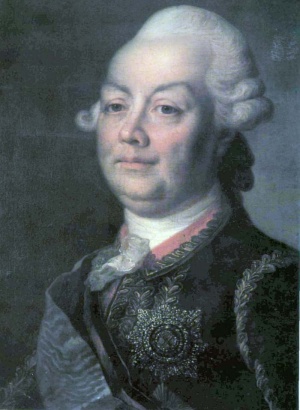Difference between revisions of "Rumyantsev, Peter Alexandrovitch (1725-1796)"
| [unchecked revision] | [checked revision] |
GameoAdmin (talk | contribs) (CSV import - 20130820) |
GameoAdmin (talk | contribs) (CSV import - 20130823) |
||
| Line 1: | Line 1: | ||
| − | [[File:Rumjanzew-sadunaiski.jpg|300px|thumb|right|''Peter Alexandrovitch Rumyantsev. Wikimedia Commons | + | [[File:Rumjanzew-sadunaiski.jpg|300px|thumb|right|''Peter Alexandrovitch Rumyantsev. Wikimedia Commons'']] Peter Alexandrovitch Rumyantsev (Pyotr Alexandrovich Rumyantsev-Zadunaisky [Russian: Пётр Александрович Румянцев-Задунайский]) (15 January 1725–19 December 1796), was a Russian general and later field marshal who received the honorable name Zadunaysky because he crossed the Danube River in the Russo-Turkish War (1770-74). During this campaign on the border between Moldau (Moldavia) and [[Poland|Poland]] he met the [[Hutterian Brethren (Hutterische Brüder)|Hutterian Brethren]] who had to leave [[Walachia (Romania)|Walachia]] and were interested in settling in [[Russia|Russia]], and invited them to settle on his estates in the [[Ukraine|Ukraine]] near Kiev, granting them very favorable privileges. |
| − | |||
| − | '']] Peter Alexandrovitch Rumyantsev (Pyotr Alexandrovich Rumyantsev-Zadunaisky [Russian: Пётр Александрович Румянцев-Задунайский]) (15 January 1725–19 December 1796), was a Russian general and later field marshal who received the honorable name Zadunaysky because he crossed the Danube River in the Russo-Turkish War (1770-74). During this campaign on the border between Moldau (Moldavia) and [[Poland|Poland]] he met the [[Hutterian Brethren (Hutterische Brüder)|Hutterian Brethren]] who had to leave [[Walachia (Romania)|Walachia]] and were interested in settling in [[Russia|Russia]], and invited them to settle on his estates in the [[Ukraine|Ukraine]] near Kiev, granting them very favorable privileges. | ||
Under the protection of an officer the Hutterites proceeded through Poland to [[Vyshenka (Chernihiv Oblast, Ukraine)|Vyshenka]], on the Desna River, where they arrived on 12 August 1770. Rumyantsev continued to be their protector and defender until his death in 1796. At this time three Brethren were sent to express their sympathy to the family and to negotiate with the heirs regarding their lease. Because of difficulties with the heirs they left Vyshenka in 1802 to settle on crown lands at [[Radichev (Chernihiv Oblast, Ukraine)|Radichev]], where they enjoyed for a while the privileges of the Mennonites of Russia. Later they settled near the [[Molotschna Mennonite Settlement (Zaporizhia Oblast, Ukraine)|Molotschna Mennonite settlement]]. | Under the protection of an officer the Hutterites proceeded through Poland to [[Vyshenka (Chernihiv Oblast, Ukraine)|Vyshenka]], on the Desna River, where they arrived on 12 August 1770. Rumyantsev continued to be their protector and defender until his death in 1796. At this time three Brethren were sent to express their sympathy to the family and to negotiate with the heirs regarding their lease. Because of difficulties with the heirs they left Vyshenka in 1802 to settle on crown lands at [[Radichev (Chernihiv Oblast, Ukraine)|Radichev]], where they enjoyed for a while the privileges of the Mennonites of Russia. Later they settled near the [[Molotschna Mennonite Settlement (Zaporizhia Oblast, Ukraine)|Molotschna Mennonite settlement]]. | ||
Revision as of 14:48, 23 August 2013
Peter Alexandrovitch Rumyantsev (Pyotr Alexandrovich Rumyantsev-Zadunaisky [Russian: Пётр Александрович Румянцев-Задунайский]) (15 January 1725–19 December 1796), was a Russian general and later field marshal who received the honorable name Zadunaysky because he crossed the Danube River in the Russo-Turkish War (1770-74). During this campaign on the border between Moldau (Moldavia) and Poland he met the Hutterian Brethren who had to leave Walachia and were interested in settling in Russia, and invited them to settle on his estates in the Ukraine near Kiev, granting them very favorable privileges.
Under the protection of an officer the Hutterites proceeded through Poland to Vyshenka, on the Desna River, where they arrived on 12 August 1770. Rumyantsev continued to be their protector and defender until his death in 1796. At this time three Brethren were sent to express their sympathy to the family and to negotiate with the heirs regarding their lease. Because of difficulties with the heirs they left Vyshenka in 1802 to settle on crown lands at Radichev, where they enjoyed for a while the privileges of the Mennonites of Russia. Later they settled near the Molotschna Mennonite settlement.
Bibliography
Hege, Christian and Christian Neff. Mennonitisches Lexikon, 4 vols. Frankfurt & Weierhof: Hege; Karlsruhe; Schneider, 1913-1967: v. III, 566 f.
Kleinschmidt, Arthur. Drei Jahrhunderte russischer Geschichte 1598-1898. Berlin, 1898.
Zieglschmid, A. J. F. Das Klein-Geschichtsbuch der Hutterischen Brüder. Philadelphia, PA: Carl Schurz Memorial Foundation, 1947.
| Author(s) | Cornelius Krahn |
|---|---|
| Date Published | 1959 |
Cite This Article
MLA style
Krahn, Cornelius. "Rumyantsev, Peter Alexandrovitch (1725-1796)." Global Anabaptist Mennonite Encyclopedia Online. 1959. Web. 12 Feb 2026. https://gameo.org/index.php?title=Rumyantsev,_Peter_Alexandrovitch_(1725-1796)&oldid=96321.
APA style
Krahn, Cornelius. (1959). Rumyantsev, Peter Alexandrovitch (1725-1796). Global Anabaptist Mennonite Encyclopedia Online. Retrieved 12 February 2026, from https://gameo.org/index.php?title=Rumyantsev,_Peter_Alexandrovitch_(1725-1796)&oldid=96321.
Adapted by permission of Herald Press, Harrisonburg, Virginia, from Mennonite Encyclopedia, Vol. 4, p. 377. All rights reserved.
©1996-2026 by the Global Anabaptist Mennonite Encyclopedia Online. All rights reserved.

